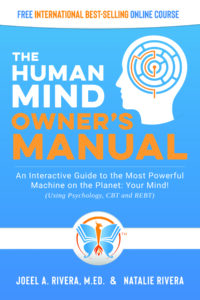We all think irrationally. Yes, even you!
It’s really easy to notice when someone else is thinking irrationally. What they say sounds illogical. It makes no sense! Even if you try to point out their error in thinking, they don’t get it. They seem locked into their point of view, like they’re blinded to the truth. It can be frustrating. But the truth is that the same thing happens to you.
We all hold wildly different beliefs—so much so that we question whether we have ANYTHING in common. However, the truth is that we all have human minds, and at their core, all minds share the same ultimate dysfunction.
We all tend to suffer (psychologically) in the same ways and for the same reasons. We ALL share 3 core irrational beliefs that are at the root of our suffering.
- APPROVAL—I must be approved of by others to be worthy.
- JUDGMENT—Other people must meet my expectations in order to be worthy.
- COMFORT—Life must be easy, without discomfort or inconvenience.
These 3 beliefs pit “us” against “them”. They are responsible for the blame game, for entitlement and for nauseating approval seeking behavior.
This. Explains. EVERYTHING.
These beliefs are like internal RULES that we have for how we, others, and the world “should” behave. The problem is that these rules are TOTALLY BOGUS. Finding out that you are WRONG has never felt SO GOOD!
If you’re tired of emotional stress and suffering, it’s time to rip those no-good beliefs out by the root!
It’s time to stop “shoulding” on yourself and others!
By identifying which of these core irrational beliefs YOU tend to fall into the most, you can begin to become aware of the situations in which you apply these bogus rules. You can look out for these beliefs in the stories you tell about yourself, others, and how life “should” be. And, most importantly, you can stop yourself from thinking irrationally and causing yourself unnecessary suffering.
You’ll even be able to spot these beliefs in others! Once you know about them, you’ll see them EVERYWHERE, and the suffering and conflict that runs so rampant will make so much more sense.
Below you will find a description of the 3 beliefs, including the consequences you will continue to experience if you do not make the effort to release this irrational B.S. (ahem, belief system). A new, rational belief is also provided to help you transition to a new perspective.
Belief #1: APPROVAL—I must be approved of by others to be worthy.
Need: acceptance, belonging
Fear: judgment, rejection
Demands: I expect myself to perform well and win approval from all significant others at all times, and if not I am a failure, unworthy, and deserve to suffer.
Symptoms:
• Places unrealistic expectations on oneself
• Over-concern with what other people think
• Achievement and popularity determine self-worth
• Self-critical, lack of self-acceptance
Emotional Consequences
• Depression, feeling not good enough, unable to express or embrace true self
• Anxiety, worry about what others think, being judged
• Low confidence, feeling bad about yourself, others disapproval means we are bad, can’t be yourself
Behavioral Consequences
• Risk-avoidance, for fear of being judged for failing or being different
• Shyness, for fear of being embarrassed
• Procrastination, for fear of failure, judgment, risk
• Unassertiveness, for fear of rejection or criticism
• Workaholism, in order to gain approval
REPLACE WITH THIS RATIONAL BELIEF:
I have value as a human being simply by being my authentic self, and I desire love only from those who appreciate me and recognize the good in me.
False Sub-Belief: I need love and approval from EVERYBODY.
• Consequence: Stifling of true self, lack of self-love and self-respect.
• Truth: Everyone has different tastes and preferences and it is impossible to be loved by everybody.
False Sub-Belief: I must be successful, intelligent and competent in all areas.
• Consequence: Preoccupation with proving adequacy, even it if means looking competent when you’re not.
• Truth: It is totally natural to be better at some things than others. It is okay to not be good at something.
False Sub-Belief: I must be dependent on other people because they are stronger than I am, and I can’t depend on myself.
• Consequence: Leads to unhealthy relationships that burden others and creates attachment based on need rather than genuine love.
• Truth: Many people are perfectly capable of doing things on their own but they continue to tell themselves they need others to help them because they are afraid to let go of control of the other person.
False Sub-Belief: My past has made me who I am and will continue to define my future.
• Consequence: Continuing to live patterns that do not serve you and failure to reach your potential due to unwillingness to take responsibility for your life.
• Truth: When you were younger, you did not understand what was happening, and therefore it impacted your behavior automatically. However, now you have the ability to think about your past and present differently and choose to act differently.
Belief #2: JUDGMENT—Other people must do “the right thing” and meet my expectations in order to be worthy.
Need: importance, superiority
Fear: unfairness, disappointment
Demands: expect all significant others to treat me kindly and fairly, as well as act appropriately, and if they don’t, they are unworthy, rotten people who deserve to be punished
Symptoms:
• Unrealistic expectations on others, including expecting them to be infallible, perfect
• Assuming you are the sole authority on what is right and wrong
• Assuming you have authority over others
• Believing everyone else is responsible for catering to your needs
Emotional Consequences
• Anger, rage or fury when others intentionally or unintentionally treat you poorly or unfairly or don’t meet your expectations
• Impatience with others who make mistakes or aren’t perfect
• Bitterness against others for not meeting your needs
• Resentment toward others for being imperfect and especially for treating you unfairly or not meeting your needs
Behavioral Consequences
• Aggression and violence as a way of punishing others for being inappropriate or not meeting expectations
• Bigotry and intolerance of anyone who does not meet your definition of right and wrong
• Bullying others to enforce your belief of the way others should behave or be
• Nagging others to elicit the right action you expect and require
REPLACE WITH THIS RATIONAL BELIEF:
All people, including myself, are imperfect, have value to offer, and have a unique perspective of the world.
False Sub-Belief: I should be concerned and upset about other people’s problems.
• Consequence: Wasted energy while focused on other people’s problems rather than focusing on directing your own life.
• Truth: Other people’s problems almost never have anything to do with you. Getting upset because someone else is upset or has a problem does not help them feel better or fix their problem.
False Sub-Belief: Everyone should treat each other, and especially me, in a fair, considerate manner or they should be punished.
• Consequence: Harsh condemnation of and possible lashing out at anyone who does not treat you the way you want to be treated, which is your definition of fairness.
• Truth: Not everyone has the same definition of fairness or being considerate, and therefore they may act differently than you would expect. you do not hold authority over other people and it is not your role to punish people for their behavior.
False Sub-Belief: People must be competent and act wisely and if not they have no value and should be punished.
• Consequence: Shaming, criticizing, and rejecting others for mistakes, errors, or undeveloped abilities.
• Truth: This hyper-judgment of others is what causes the cultural perpetuation of approval seeking behavior. Even if a person has a low level of competence, they still have innate value and dignity as a human being and are worthy of respect. Also, they are capable of learning, growing and improving.
False Sub-Belief: When other people behave badly it means they are bad and should be punished.
• Consequence: When others make mistakes or do things you disapprove of, judging them as bad and punishing them: a) equates the behavior with the person and b) does not lead to any form of improvement or resolution.
• Truth: Human beings are not perfect and make mistakes. A person’s behavior in one moment does not define their character or worthiness. Everyone has a reason for why they act the way they do. Everyone has a different perspective of what is right and wrong.
Belief #3: COMFORT—Life must be easy, without discomfort or inconvenience.
Need: certainty, comfort, justice
Fear: adversity, uncertainty, discomfort
Demands: expect all external conditions to be pleasant and favorable at all times and when they’re not it is awful and unbearable.
Symptoms:
• Unrealistic expectations about life being perfect
• Belief that living a trouble-free life is a birthright
• Lack of belief in your ability cope with adversity
• Complete rejection of all life problems as unacceptable
Emotional Consequences
• Low frustration tolerance
• Self-pity and “poor me” attitude
• Depression, hopelessness
• Discomfort anxiety
Behavioral Consequences
• Procrastination
• Shirking
• Drug and alcohol abuse
• Overindulgence in “feel good” behaviors (e.g., overeating)
REPLACE WITH THIS RATIONAL BELIEF:
It is perfectly natural for life conditions to not be ideal or perfect and it’s okay if situations do not exist the way I would prefer because I am capable of finding solutions to problems and making changes that bring me happiness and opportunity regardless of the situations that happen around me.
False Sub-Belief: Things must go the way I want them to go and I should have control over them.
• Consequence: Anger and frustration when things don’t go the way you want does not help you change the situation. Expecting everything to be exactly as you want it gives away your power to be happy until everything is perfect, which it won’t be, ever.
• Truth: In most situations, outside conditions are almost completely outside of your control. What you do have control over is what happens internally, such as your thoughts and emotions about a situation.
False Sub-Belief: If something is or may be dangerous or unpleasant I should continue to worry about it.
• Consequence: Unnecessary worry causes anxiety and stress and takes away time and energy from productive solutions or other important aspects of life
• Truth: If nothing can be done about the situation, there is no benefit to upset yourself by continuously thinking about it. Worrying does not prevent it from happening. If it’s going to happen anyway, you benefit more from being in a more calm, healthy emotional place between now and then.
False Sub-Belief: My unhappiness, sorrow, and disturbance are caused by unpleasant or undesirable situations, and therefore I must avoid these situations.
• Consequence: Preoccupation with controlling situations and people, leading to frustration when faced with the fact that this is not possible. Avoidance of anything that could go wrong, which leads to a very limited life.
• Truth: Your unhappiness and disturbance is caused by judgment of the undesirable situations, not by the situations themselves.
False Sub-Belief: It is easier to avoid, rather than face and deal with, life’s difficulties, challenges and responsibilities.
• Consequence: By avoiding difficulties you avoid the potential positive benefit of facing them, plus in many cases you are only putting off problems that you will need to face later, when they will often be worse.
• Truth: Putting off responsibilities, such as procrastinating, only makes the task harder and more stressful. Almost all worthwhile pursuits, accomplishments, goals, and experiences require some level of challenge or unpleasant activity.
False Sub-Belief: I am supposed to just be happy. I do not have control over my emotions.
• Consequence: When you are not happy all the time you will either blame yourself for being unworthy or blame the outside for not meeting your expectations and making you happy.
• Truth: While happiness can spontaneously arise when pleasant situations exist in your life, happiness does not depend on favorable external conditions. It is not the situation itself that causes the emotion, it is the result of the way you think about and judge the stations that happened.
False Sub-Belief: All problems must have a perfect solution and that solution must be found.
• Consequence: Inability to accept the reality of a situation and take action to make improvements because the solution is not perfect. Obsession with making a situation perfect, which often makes it worse.
• Truth: Expecting a solution to be perfect will prevent you from identifying possible options or moving forward with any solution at all.
The question is:
A. Will you spend the rest of your life groveling for approval, hating on others, and being disappointed by life—and blaming all of it for your misery?
B. Or, will you accept that you, others, and life simply are what they are, and only your irrational expectations and rules about it all have the power to make you miserable?
The choice is yours.
…………………………………………………………………………..
GIVE YOUR MONKEY MIND A BANANA!
Learn how to squash your irrational thinking with The Human Mind Owner’s Manual that you never knew existed! Based of 2 of Transformation Academy’s best selling online courses, on CBT and REBT, this book is an interactive guide to the most powerful machine on the planet: your mind!
Get the book or enroll in either or both of the courses for only $10 each! Click below.








